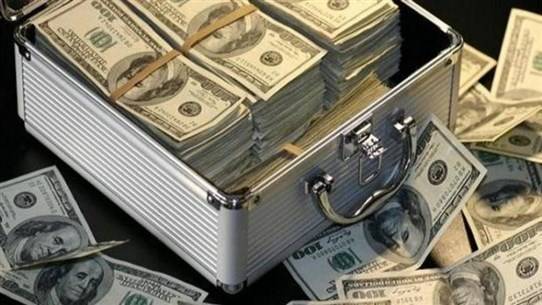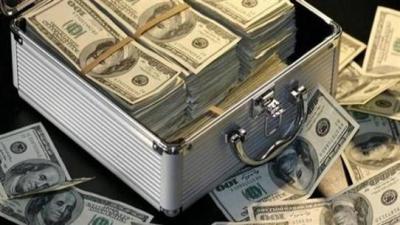The theft of one million and fifty thousand US dollars from a home in Lebanon was not the only incident in the country, which is experiencing one of the worst financial and economic crises in its history; however, it was the largest in a series of thefts that have targeted Lebanese homes recently. These incidents reveal the transformation of Lebanese homes into small banks, as people have lost faith in the banking sector, which has withheld funds from all Lebanese—except for the privileged—deposited in banks since October 2019.
Technically, Lebanese individuals have no choice but to rely on themselves to protect their money, as trust in banks has significantly diminished. A senior banking official told "Asharq Al-Awsat" that incoming remittances to the country amount to about 7 billion dollars annually; however, all this money "disappears quickly from the banks' coffers, as its owners withdraw it at the same speed it arrives."
Officials estimate that approximately 10 billion dollars are currently held in Lebanese homes, a figure that is continuously rising, equaling or exceeding the reserves at Lebanon's central bank, recently estimated at 10.8 billion dollars, according to the finance minister before parliamentary committees last week. The banking official noted that only about 2 billion dollars remains on average in the banks, primarily needed by merchants and industrialists to secure imports.
Since October 17, 2019, banks began regulating cash withdrawals for citizens who rushed to their counters after they had closed for a period amid popular protests, and they ultimately stopped withdrawals entirely. All Lebanese accounts in banks were converted into "phantom dollars," termed "lollar," meaning Lebanese dollars, to distinguish it from actual dollars that entered the country after this date, which account holders have the right to withdraw entirely.
After the state refrained from paying off debts that Lebanese banks primarily underwrite, banks similarly stopped settling their customers' accounts, creating a significant crisis in the country, all without any legal basis. In the absence of a capital control law, influential individuals managed to transfer billions of dollars to external accounts, while what remained of funds was converted to "lollar," currently valued at about 18 cents. In contrast, foreigners and Lebanese with Western nationalities were able to retrieve their deposits forcefully in their countries after a series of lawsuits, particularly in the United States, where its banks are considered an essential avenue that Lebanese banks cannot do without.
With changing circumstances, Lebanese people are now required to find alternatives to protect their funds. Many have turned to investing in real estate and other alternatives, while those with foreign accounts have transferred as much as they could there. The rest have no choice but their homes, especially since bank vaults are no longer a good option.
George, a Lebanese building trader, recounts that he placed his money in a safe deposit box at a bank; however, he soon realized it was impractical due to repeated bank closures, which struck for days and weeks in protest against the assaults on their funds by disgruntled depositors. Residents in a mountainous village in northern Lebanon report that one person prepared an underground hole in his garden to store his savings, then planted a tree above it for disguise. In homes, some have converted rooms into large safes, placing smaller safes inside to complicate matters for thieves.
The market for metal safes has seen significant growth since the beginning of the Lebanese crisis. It is no longer limited to large safes; many have opted to purchase smaller metal safes weighing no more than eight kilograms, which can be secured to a wall within a closet, preventing theft. A safe dealer in Beirut stated that in 2020 he sold about 300 small safes in three different sizes, priced between 35 and 55 dollars, noting to "Asharq Al-Awsat" that this number "is unprecedented in the ten years preceding the crisis, when people felt secure in depositing their money in banks." He added: "Interest was high, although it has now decreased compared to 2020, which is a significant indicator that people have turned their homes into safes."
Resorting to metal safes is seen as the safest method compared to leaving cash unprotected at home. Over the past three years, security forces have reported numerous theft incidents from homes, while social media in 2020 buzzed about an incident where a bundle of burned dollars was found among the belongings of an elderly woman who passed away earlier in southern Lebanon. The woman had kept a sum of money in one of her cushions but had not informed anyone of it.
Having lost 107 thousand dollars in one of the Lebanese banks that retained his deposits, Ali (38), an expat in Africa, decided against depositing his money in any bank and bought a small safe, placing it in his home. His family now withdraws his monthly salary of about 3 thousand dollars and that of his brother and deposits them at home. This method signifies the latest shift in how Lebanese individuals handle their finances. Some expats have opted for foreign banks in Cyprus, Turkey, or Dubai to deposit their funds, while others have chosen to invest in real estate, "as it is a safer investment," or cars, "to avoid regretting if our money disappears," while others have opted for homes as a storage option following the decline of trust in banks.
However, the risk of having money at home prompted brothers Ali and Firas to invest any surplus into real estate. They stated, "Three years ago, my brother and I managed to buy two small properties in the village. This investment is the most profitable, secure, and reliable," as he told "Asharq Al-Awsat," noting that his trust in banks "has vanished, and they no longer enjoy high reliability, even if circumstances change." He added: "If I had invested in real estate, I would not have lost my life savings that I had deposited in the bank for 12 years, which ultimately vanished into thin air."
Since the onset of the crisis, the lifestyle of Lebanese individuals regarding money retention or spending has shifted. Zeina (34), who has been working in an Arab country since 2016, stated that she managed to buy two cars at the start of the crisis using her bank deposit through a bank check. She told "Asharq Al-Awsat": "I acted on my uncle’s advice, and it was the right move." She added: "At least I gained two cars instead of waiting for the government to take any action that would lead to additional losses."
However, her cousin, who had about 25 thousand dollars in the bank, resorted to cashing out her deposit via a bank check and exchanging it for cash, incurring a loss of nearly 20 percent early in the crisis, noting that the value of bank checks is now 82 percent less than their actual value, given that most banks refuse to deposit hard currency checks into individual accounts, limiting them to companies, and only allowing them to be withdrawn through a check or transfer if accepted "to reduce the old dollars known as (lollar) from bank accounts," according to the manager of one banking branch.
The head of the banking association in Lebanon, Salim Safa, rejects holding banks responsible for the current crisis. Safa, whose home and offices have been attacked multiple times by angry depositors, states that rebuilding trust is the essential path to saving Lebanon, and it should be the main theme of any comprehensive treatment plan to rescue the economy from its severe crisis, address financial and monetary gaps, and reassure savers and investors about the safe investment of their funds in financial and banking institutions by establishing reliable mechanisms to restore full order to the financial sector, including customary credit and investment operations for individuals and companies both within and outside the country.
Safa believes that as long as the core of the crisis lies in public finance, attention must be directed towards formulating appropriate proposals to address the root problem, and then deal with the gaps and repercussions it has produced on the economy and its productive sectors.




